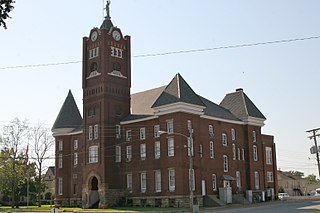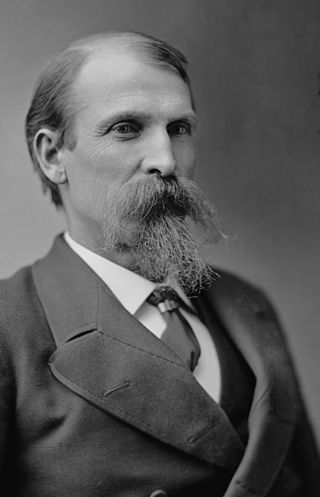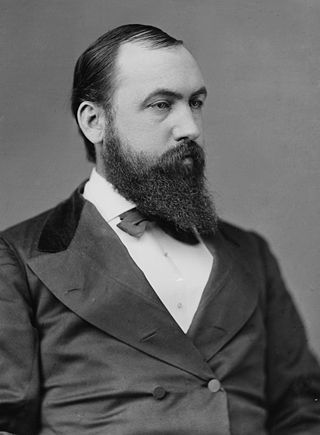
Harmon Liveright Remmel (born Stratford, New York, January 15, 1852; died Hot Springs, Arkansas, October 14, 1927), was a German-American politician and businessman. He led the Arkansas Republican Party from roughly 1913 to his death in 1927.

Harmon Liveright Remmel (born Stratford, New York, January 15, 1852; died Hot Springs, Arkansas, October 14, 1927), was a German-American politician and businessman. He led the Arkansas Republican Party from roughly 1913 to his death in 1927.
Remmel's father Gottlieb Remmel (1813–1892), a tanner, and mother Henrietta (Bever) Remmel (1814–1896) were born in Germany; they came to the United States in 1848 to avoid conscription into the army. They came first to New York state, where Harmon was born in 1852 in the rural town of Stratford near the southern edge of the modern Adirondack Park. Remmel attended Fairfield Academy in nearby Fairfield, New York and then taught school for a year. In 1871 he and his older brother Augustus Caleb Remmel (1847–1883) went to Fort Wayne, Indiana and engaged in several enterprises, ending up in the lumber business. From 1874 to 1876 they went to New York City and worked as a representative of their firm there. Finally in 1876 he and his brother set up the Remmel Brothers Lumber Company in Newport, Arkansas, which they operated together until his brother's death in 1883. [1]
In 1896 Remmel left the lumber business and moved to Little Rock, where he became the Arkansas general manager for the Mutual Life Insurance Company of New York, a post he held until 1922. In 1902 he organized the Mercantile Trust Company, a bank which he led as president until 1912; he then organized another bank, the Banker's Trust, and led that 1914–1923. He was the president of the Arkansas Bankers' Association in 1922.
As soon as Remmel arrived in Arkansas in 1876 he was elected to the Newport town council, serving two terms. He ran for state representative in Jackson County in 1882, losing to Democrat Wiley M. Baird. In 1884 he was the Republican candidate for United States Representative in Arkansas's 1st congressional district, losing to incumbent Democrat Poindexter Dunn, [2] and also obtained a seat on the Republican state central committee, which he kept until his death in 1927. In 1886 he was elected as a Republican to be a state representative for Jackson County, due in part to the Democratic vote being split by a candidate from the Agricultural Wheel. [3] Starting in 1892 he was a delegate to all the Republican National Conventions through 1924. He was the Republican candidate for governor in 1894, 1896, and 1900, losing to James Paul Clarke, Daniel W. Jones, and Jeff Davis. Remmel became one of the most important lieutenants of former governor and Senator Powell Clayton (1833–1914), the boss of the Arkansas Republican party. In 1895 Clayton arranged for Remmel to be elected president of the Arkansas League of Republican Clubs, displacing a Republican dissident, Asbury Fowler. In 1897 Remmel became the Arkansas representative to the Republican National Club, also called the League of Republican Clubs. He was the chairman of the state Republican central committee from 1900 to 1905, from 1910 to 1916, and from 1921 until his death. [4] In 1913 he succeeded Powell Clayton as Arkansas' representative on the Republican National Committee. In 1916 he was the Republican candidate in a special election to replace United States Senator James P. Clarke, losing to Democrat William F. Kirby.
As a powerful figure in Arkansas Republican politics, Remmel benefited from political patronage on the national level, starting with an appointment as postmaster in Newport in 1877. He held the position of state collector of internal revenue from 1897 to 1902 and from 1921 to his death. He was appointed marshal of the Eastern District of Arkansas in 1903.
As late as 1912, Remmel as a lieutenant of Clayton supported the "black and tan" policy of alliance with black Republicans. [5] After Clayton's death, Remmel became the most powerful figure in the Arkansas Republican party, although his power was not always secure. Remmel's part in the struggle from 1914 on between the "Lily White" faction in the Arkansas Republican Party (led by his nephew A. C. Remmel) and black Republicans was unclear; he didn't clearly favor one side in the conflict, but neither did he block the sidelining of black Republicans. [6] Mostly he favored the continuation of "black and tan", but not at the expense of party unity or his own control of the party. [7]
Remmel suffered a stroke on May 1, 1927, and attempted to recover at a hospital in Hot Springs, Arkansas. His political influence lasted right to the end of his life; one of his few visitors there was Herbert Hoover, whom Remmel subsequently endorsed for president. [8]
Remmel was commissioned a lieutenant colonel in the Arkansas state militia and was often referred to as "Colonel". [9]
Remmel married Laura Lee Stafford (1853–1913) in 1878. In 1915 he married Elizabeth Irene Cameron (1878–1926) and adopted her daughter Elizabeth (1915–1960); they had one child together, Harmon Liveright Remmel Jr. (1916–2003).
Remmel is buried in Oakland-Fraternal Cemetery in Little Rock.
Remmel organized and promoted the Arkansas Anthracite Coal Company starting in 1905; this vast and ultimately unsuccessful effort to exploit coal deposits in Logan County led to the creation of the city of Scranton, Arkansas.
The first hydroelectric dam in Arkansas was named in his honor due to his help in obtaining a licence. [10]
Remmel Avenue in Newport is named after him and Remmel Park in Newport was given to the city by his family in 1930. The Remmel Apartments in Little Rock were built by Remmel as rental properties in 1917.

The 1852 United States presidential election was the 17th quadrennial presidential election, held on Tuesday, November 2, 1852. Democrat Franklin Pierce defeated Whig nominee General Winfield Scott. A third party candidate from the Free Soil party, John P. Hale, also ran and came in third place, but got no electoral votes.

Newport is a city in and the county seat of Jackson County, Arkansas, United States located on the White River, 84 miles (135 km) northeast of Little Rock. The population was 7,879 at the 2010 census.

Orval Eugene Faubus was an American politician who served as the 36th Governor of Arkansas from 1955 to 1967, as a member of the Democratic Party. In 1957, he refused to comply with a decision of the U.S. Supreme Court in the 1954 case Brown v. Board of Education, and ordered the Arkansas National Guard to prevent black students from attending Little Rock Central High School. This event became known as the Little Rock Crisis. He was elected to six two-year terms as governor.

Powell Foulk Clayton was an American politician, diplomat, and businessman who served as the 9th governor of Arkansas from 1868 to 1871, as a Republican United States Senator for Arkansas from 1871 to 1877 and as United States Ambassador to Mexico from 1897 to 1905.

The Brooks–Baxter War, also known as the Brooks–Baxter Affair, was an attempt made by failed gubernatorial candidate Joseph Brooks of the “Brindle-tail” faction of Arkansas' Republican Party to take control of the state from Elisha Baxter, who was the Republican governor. The victor in the end was the Baxter administration, also known as the "Minstrels", supported by "carpetbaggers" over the Brindle-tails supported by "scalawags" and "freedmen".

The Solid South or the Southern bloc was the electoral voting bloc of the states of the Southern United States for issues that were regarded as particularly important to the interests of Democrats in those states. The Southern bloc existed between the end of the Reconstruction era in 1877 and the passage of the Civil Rights Act of 1964. During this period, the Democratic Party overwhelmingly controlled southern state legislatures, and most local, state and federal officeholders in the South were Democrats. During the late 1800s and early 1900s, Southern Democrats disenfranchised blacks in all Southern states, along with a few non-Southern states doing the same as well. This resulted essentially in a one-party system, in which a candidate's victory in Democratic primary elections was tantamount to election to the office itself. White primaries were another means that the Democrats used to consolidate their political power, excluding blacks from voting in primaries.

The 1966 United States House of Representatives elections was an election for the United States House of Representatives on November 8, 1966, to elect members to serve in the 90th United States Congress. They occurred in the middle of President Lyndon B. Johnson's second term. As the Vietnam War continued to escalate and race riots exploded in cities across the country, Johnson's popularity had fallen, and the opposition Republican Party was able to gain a net of 47 seats from Johnson's Democratic Party, which nonetheless maintained a clear majority in the House. This was also the first election that occurred after the Voting Rights Act of 1965 became law, the first time since 1870 that a Republican won a House seat in Arkansas, and the first since 1876 that the party did so in South Carolina.

Stephen Wallace Dorsey was a Republican politician who represented Arkansas in the United States Senate from 1873 to 1879, during the Reconstruction era.

Winston Lewis Prouty was an American politician. A member of the Republican Party, he served as a United States Senator from Vermont from 1959 until his death. He was previously a member of the United States House of Representatives, serving Vermont's At-large congressional district, from 1951 to 1959.

The 1912–13 United States Senate elections were held on various dates in various states. They were the last U.S. Senate elections before the ratification of the Seventeenth Amendment in 1913, establishing direct elections for all Senate seats. Senators had been primarily chosen by state legislatures. Senators were elected over a wide range of time throughout 1912 and 1913, and a seat may have been filled months late or remained vacant due to legislative deadlock. Some states elected their senators directly even before passage of Seventeenth Amendment. Oregon pioneered direct election and experimented with different measures over several years until it succeeded in 1907. Soon after, Nebraska followed suit and laid the foundation for other states to adopt measures reflecting the people's will. By 1912, as many as 29 states elected senators either as nominees of their party's primary or in conjunction with a general election.

Alanson Mellen Kimball was an American politician who served as a member of the United States House of Representatives from Wisconsin's 6th congressional district. He also served one term in the Wisconsin Senate, representing Adams, Juneau, and Waushara counties.

William Seelye Linton was an American businessman and politician who served two terms in the U.S. House of Representatives from Michigan from 1893 to 1897.

John Middleton Clayton was an American politician who served as a Republican member of the Arkansas House of Representatives for Jefferson County from 1871 to 1873 and the Arkansas State Senate for Jefferson County. In 1888, he ran for a seat in the United States House of Representatives but lost to Clifton R. Breckinridge. Clayton challenged the results and was assassinated in 1889 during the challenge to the election. He was declared the winner of the election posthumously. The identity of his assassin remains unknown.
Wallace Townsend was an American lawyer who was from 1928 to 1961 the Republican national committeeman for the U.S. state of Arkansas. When he left his party's national committee, he was succeeded by Winthrop Rockefeller, who was elected five years thereafter in 1966 as the state's first Republican governor since the Reconstruction era.

The Oakland–Fraternal Cemetery is a historic cemetery on Barber Street in Little Rock, Arkansas. It actually consists of six originally separate cemeteries, and lies adjacent to the Little Rock National Cemetery, of which it was once a part. Portions of the cemetery are dedicated to Confederate war dead, and its grounds include two separate Jewish cemeteries, and the Fraternal Cemetery. The Fraternal side, established by the Grand United Order of Odd Fellows, was a burying ground for African Americans. The combined cemetery, listed on the National Register of Historic Places in 2010, continues in active use.

The 1894 Arkansas gubernatorial election was held on September 3, 1894.

The 1896 Arkansas gubernatorial election was held on September 7, 1896.

The 1900 Arkansas gubernatorial election was held on September 3, 1900.

The 1902 Arkansas gubernatorial election was held on September 1, 1902.